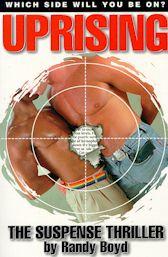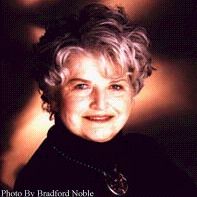 |

 |
|
Author of The Front Runner
The gay world owes a big debt to books. Before Stonewall in 1969, before TV became a factor in American consciousness, the oldest among us found classics that helped orient our sexual questionings. Stores like Oscar Wilde Memorial Bookstore were on the scene when all our print media fit into one small room. Our books have provided grist for TV films, documentaries, Internet sites, civil-rights litigation, academic studies. Health books, popular genres like lesbian mysteries -- these are indispensable to us. And, as Paul Monette pointed out to me, older gay authors often inspire new authors to write. Starting in the early 1970s, more gay titles surged into print, as big publishers and wholesalers recognized our books' moneymaking power. We grew from the first ALA gay and lesbian book awards, to a list of 90 gay bookstores nationwide. But today, as our titles in print reach 16,000 and the gay world peaks in national visibility, our books face real threats.
Our books are also caught in a general downsizing in mainstream publishing. Growing illiteracy, spiraling book prices, appeal of movies and Internet -- made U.S. book sales plummet from 1.7 billion to 1.4 billion last year, according to the BookExpo America Show Daily. Some big and medium publishers are now owned by foreign media empires meaning that decisions will be made by editors and executives who don't feel accountable to U.S. minorities. Other publishers shrink staffs, postpone titles, reduce what the trade calls "midlist" books. Most gay books fall into "midlist," meaning that a title might sell between 2500 and 100,000 copies. In a trade now geared to multimillion-copy blockbusters, even an author with 100,000 copies in print might be dropped. Result: an estimated 20-percent drop is ahead in new gay and lesbian titles, according to gay distributor Alamo Square. Some publishers have closed entire lines of gay books. Due to belief that "the epidemic is over," sales of AIDS books crashed. Some successful gay and lesbian authors find themselves without a new contract, and turn to writing non-gay books. Other displaced authors find homes with gay-friendly indies like Haworth. But indies have a limited capacity to soak up the overflow.
 Some gay and lesbian authors start their own imprints. Recent successes include Charles Ortleb and his groundbreaking novel Iron Peter, now in its 7th printing. Randy Boyd's Uprising, first title from his West Beach Books, was a '99 Lambda Awards nominee. Fortunately, distributors and Internet booksellers recognize the self-publishing trend, so they carry many of these personal imprints. Yet most authors are emotionally and financially unprepared to hustle their own books.
Some gay and lesbian authors start their own imprints. Recent successes include Charles Ortleb and his groundbreaking novel Iron Peter, now in its 7th printing. Randy Boyd's Uprising, first title from his West Beach Books, was a '99 Lambda Awards nominee. Fortunately, distributors and Internet booksellers recognize the self-publishing trend, so they carry many of these personal imprints. Yet most authors are emotionally and financially unprepared to hustle their own books.
Gay books also face erosion of their independent-bookstore marketplace. According to Alamo Square, the number of gay-owned bookstores dropped by 23 percent in the last five years, from 90 to 69. Landmark Manhattan bookseller A Different Light may close, dragging the rest of the three-store chain with it. Wildcat Press, my own publishing company, has seen a quarter of our gay-owned vendors go out of business. A similar decline is happening among gay-friendly independents, meaning those with general books plus a gay/lesbian section. As everybody now knows, chainstore competition does force some independent stores to close. Many chainstores now have a gay/lesbian section, and their deep discounts lure gay bookbuyers away from our community stores. This competition includes big Internet booksellers like Amazon.com. Another chain-related threat may be more insidious and long term -- as independent stores vanish, the present rich diversity of gay, lesbian, bisexual and transgendered titles may suffer. (It's important to note that chainstores do provide gay people with benefits. They sell gay and lesbian books to closeted teens and adults, parents of gay children, curious or compassionate straights, and others who might never visit a gay bookstore. In some cities where there is no gay bookstore or community center, I have seen the chainstore coffeehouse functioning as a gay-friendly meeting place for youth and adults). With sales shrinking and costs rising, gay and lesbian publishers are forced to find new cash -- credit-card debt, subsidiary-rights sales, film sales, a second business, volunteer help. Banks are not too willing to make loans to struggling imprints. Several gay and lesbian-owned publishers tell me they can't afford to publish new titles, or are perilously close to closing. "I'm tired and burned out," one woman publisher told me. "I don't know how much longer we can hold on." Not all the threats come from outside. Unfortunately, gay books have problems caused by gay people. Most gay business interests have let the economic burden of online bookselling fall on the shoulders of individual bookstores. In so doing, they allowed Amazon.com and other non-gay Internet sellers -- who can operate at a loss, as they are presently doing, because they are subsidiaries of major companies -- to walk away with discount business on gay books. Lesbian-owned Rising Tide Press puts it bluntly: "If our business interests don't start supporting our own print media, pretty soon there weren't be any print media." Several gay and lesbian bookstores do sell books online. But they can't compete with 30-percent discounts on non-gay sites. As bookseller Deacon Maccubbin told me when he put Lambda Rising's site online, the operating costs of a title database, complete with features like shopping cart, cross-referencing, search, cover graphics, etc. -- are high. Thirty percent, on top of operations costs, has to come out of either the retailer's or the publisher's hide. Because of small profit margin, small publishers have limited ability to discount books. Another problem is high cost of advertising. Our national publications are euphoric about finally getting big mainstream advertisers. But they raise their rates accordingly, and seem to have forgotten that community businesses can't afford to pay the same rate per page as a big airline. Result: when planning promotion for new titles, most gay or lesbian publishers ignore the gay media, and rely on direct mail to booksellers or standard announcements in trade publications. When gay bookstores die, it isn't always because a chainstore opens nearby. Some stores are killed by separatism -- when the gay male storeowner didn't do enough for women in his area, or the lesbian storeowner snooted her male bookbuyers. Some booksellers run their store like a PC activist organization instead of a business. They won't carry this or that bestseller "because I don't agree with it." This is their right, of course -- but it probably isn't good business. Some booksellers crash and burn after they add men's sex materials -- magazines, books, videos, calendars, sex toys -- as a sideline. They do get a temporary shot of extra cash. But the store's atmosphere changes, and they lose lesbian customers, as well as gay and lesbian parents who don't want their children to see "that kind of stuff." Bookstores, publishers and authors also falter because our niche has lots of window dressing, but little in the way of professional associations -- the kind that help book people get information, services, resources, legal help. We have Internet discussion lists that are helpful, like Q*ink and the Lambda Rising booksellers list. But we have little else. Booksellers who feel the need must seek mainstream training and support programs like the ABA's BookSense. Our publishers have no national association. Our book authors don't have an association or guild; when we have legal trouble, some of us go to the mainstream Authors Guild. The "gay and lesbian aisle" at BookExpo America crumbled because few publishers can now afford to attend. Indeed, we are probably the only major book genre without its own trade publication. (Lambda Book Report is read by many gay book people, but is more equivalent to New York Times Book Review.)
Last but not least, many gay people share most Americans' perception that authors are not as important as Hollywood stars, politicians, athletes, performance artists, comics, celebrated drag queens, even gay porno stars. Gay book awards, book controversy, etc. generate way less interest than do speculations about a gay kiss on "Will and Grace". In the microcosm that we inhabit, these attitudes have an implosive effect. Are there any bright spots? A few new gay and lesbian bookstores have opened. As the circuit-party era shows signs of waning, some gay business people want to sponsor, or invest into, events that are more culturally oriented. Gay and lesbian reading clubs are spreading. At the Los Angeles BEA, a round table hosted by Sacramento bookseller The Open Book brought together concerned publishers, storeowners and self-publishing authors, to discuss forming our first professional association. In the mainstream, the Amazon bubble may inevitably burst. Internet booksellers may scale back discounts, opening a window of opportunity for gay and lesbian independent booksellers to offer competitive discounts and win back some customers. But our own media need to help -- not only by reviewing more books and making books and authors more exciting, but by offering discount ad rates to publishers and booksellers. Recently I was asked to sign an open letter asking gay people to buy books at gay bookstores. Great idea...but if our own media don't do more to make books appealing, and book advertising affordable, so that bookbuyers know what's available, these last-ditch political efforts won't help much. As we enter a new millennium, we can't take our gay and lesbian book heritage for granted. If major action isn't taken soon, I have to wonder how many new faces will replace those who will disappear in the next year or two. Copyright 1999 by Patricia Nell Warren. All rights reserved. About the Author: Patricia Nell Warren has 40 years' experience in publishing. Starting in 1959 at The Reader's Digest, she rose to book editor, working with a number of prominent authors, till 1980. Her own author career started in 1971, with a first novel from Dial Press. She published bestsellers The Front Runner, Harlan's Race, Billy's Boy. Today she is co-owner and co-founder, with author/publicist Tyler St. Mark, of Wildcat Press, an independent author imprint. She belongs to The Authors Guild, is active in the ad-hoc group working to launch a gay publishing association, and serves as consultant for a growing number of self-publishing authors. Her bio and photograph are available on the Wildcat Press web page at wildcatpress.com |
 © 1997-99 BEI
© 1997-99 BEI
 Patricia Nell Warren
Patricia Nell Warren  Patricia Nell Warren's The Front Runner helped launch the gay publishing industry.
Patricia Nell Warren's The Front Runner helped launch the gay publishing industry.